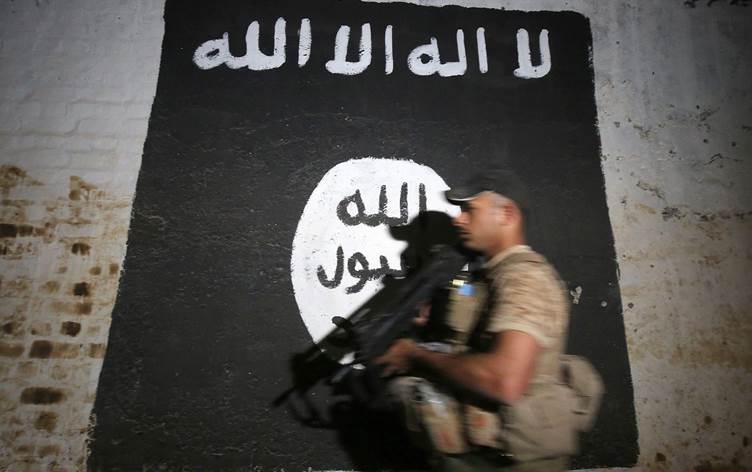ERBIL, Kurdistan Region – Islamic State (ISIS) militants will take advantage of the recent US drawdown in Iraq and Syria to increase attacks on “the crusaders”, ISIS spokesman Abu Hamza al-Qurashi said in an audio statement published Thursday.
In the 33-minute recording released on messaging app Telegram, titled “The Crusaders Will Know Who Will Win in the End”, Qurashi claimed the recent wave of attacks is only the start of a much broader campaign to come.
“Our jihadists will start to increase their attacks against the crusaders since the US has withdrawn from Iraq,” Qurashi said. “Our current attacks are only the start of bigger attacks in Iraq and Syria.”
US forces have withdrawn from several Iraqi bases in recent months as part of a general repositioning in response to successes in the campaign to defeat ISIS and to protect personnel amid the COVID-19 pandemic.
In the space of a month, the US-led coalition has handed over control of six military bases to the Iraq Security Forces (ISF), including Abu Ghraib near Baghdad, K1 in Kirkuk, al-Qaim near the Syrian border, Qayyarah in western Iraq, al-Sqoor in Mosul, and Al-Taqaddum in Anbar.
ISIS views the withdrawal as an opportunity to spread its insurgency.
“Greater punishment against crusaders is coming once the caliphate achieves the victory and is established once again,” Qurashi said, referring to the so-called “caliphate” the group established across the Iraq-Syria between 2014 and 2017.
Addressing the “government of infidels in Iraq” directly, Qurashi vowed not a single day will pass without bloodshed.
ISIS seized control of vast swathes of Iraq and Syria at the height of its power between 2014 and 2016.
Although the group was declared territorially defeated in Iraq in December 2017 and in Syria in March 2019, ISIS has continued to launch attacks, including kidnappings, assassinations, and ambushes, particularly in rural areas.
ISIS has been held responsible for a spate of attacks on the Iraqi Security Forces (ISF) and units of Popular Mobilization Forces (PMF), also known as Hashd al-Shaabi.
On May 15, the PMF said four of its fighters were killed and six injured in an ISIS attack in northern Diyala.
In a statement on May 14, the PMF said its units had come under attack in Khanaqin, Jurf al-Nasr (formally known as Jurf al-Sakhir), and on the Syrian-Iraqi border in the Akashat area of western Anbar.
On May 15, the Iraqi defense ministry said two of its soldiers were killed and four wounded when their convoy hit an IED in northern Baghdad province. ISIS later claimed responsibility for the blast.
These follow a spate of attacks in early May, the deadliest of which saw ten PMF fighters killed in a five-pronged assault in Saladin on May 2.
On the same day, militants killed three federal police officers and wounded two others in an attack on Zaghniya police station in Diyala province.
These attacks came immediately after the Iraqi parliament approved the new cabinet of Prime Minister Mustafa al-Kadhimi, who has made combatting ISIS remnants a cornerstone of his government’s agenda.
In his audio statement, ISIS spokesman Qurashi branded Kadhimi’s administration an “American government” and vowed to fight it just as the group had fought past administrations.
“Mustafa al-Kadhimi’s government is an American government and we will fight it same as we fought other Iraqi infidel governments,” Qurashi said. “Iran, infidels of Houthis, and the Iraqi government should be aware that the jihadists will destroy you everywhere in the region.”
However, since Kadhimi took office, three ISIS leaders have been killed in coalition airstrikes in Syria’s Deir ez-Zor.
Iraqi Counter Terrorism Forces (ICT) confirmed the death of senior ISIS figure Mootaz Noman al-Jubouri, known as the wali (governor) of Iraq, in an official statement on Tuesday.
On Friday last week, the US-led coalition confirmed the death of two ISIS leaders in an airstrike.
The strike killed Ahmad ‘Isa Ismail al-Zawi, otherwise known as Abu Ali al-Baghdadi, the terror group’s leader in northern Baghdad, and Ahmad ‘Abd Muhammad Hasan al-Jughayfi, a senior supplies and logistics leader across Iraq and Syria.
Concluding his audio statement, Qurashi addresses ISIS supporters, saying Abu Ibrahim al-Hashimi al-Qurashi, the group’s leader, sends his regards.
Qurashi also says the group will stage mass prison breaks to release ISIS supporters held in Iraq’s jails. A mass prison break could quickly swell the group’s ranks and undo years of counter-terror work.
“Abu Ibrahim al-Hashimi al-Qurashi is sending greetings and pleased with the recent attacks,” Qurashi said. “He asks the jihadists to set free their fellow jihadists inside the prisons and asks the jihadists inside the prisons to be patient and stay awake.”
On May 15, ISIS published a 49-minute video on Telegram – titled ‘Strike the Necks’ – in which a masked militant holding an assault rifle says ISIS will scale up its attacks on Iraqi police and security forces.
“We came to behead you and burn your houses, and I want to let our brothers and sisters in the prisons of infidels know that we have not forgotten you and we ask you to be patient,” the militant says. “We will come for you, because it is an obligation to set you free from the infidels.”

